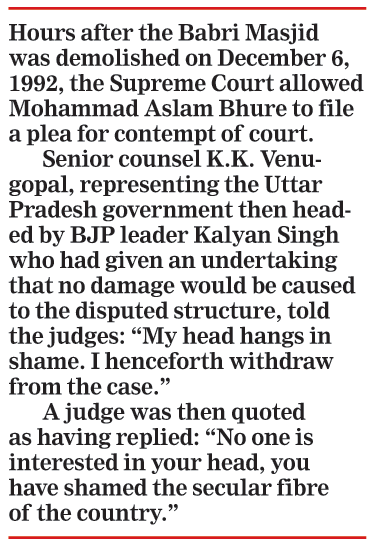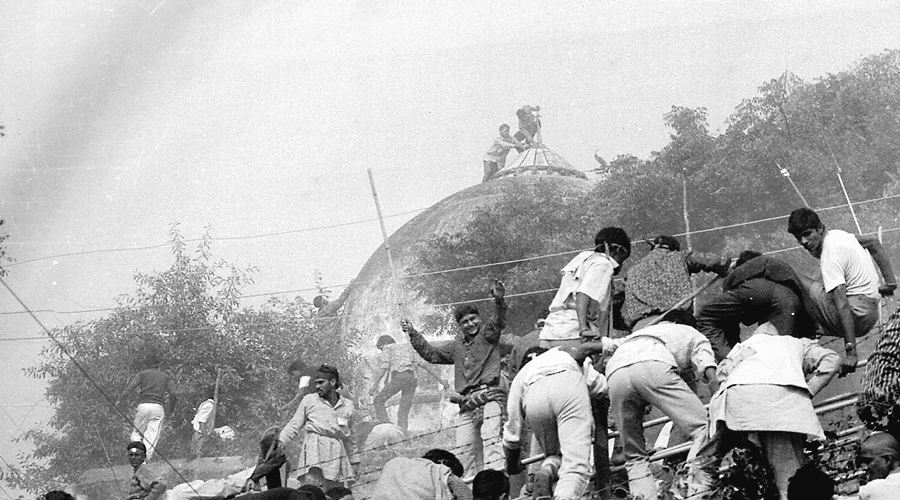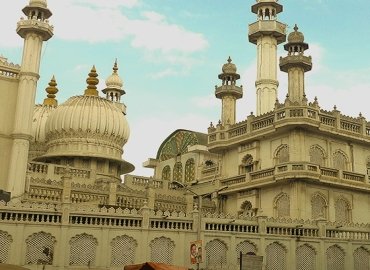The Supreme Court on Tuesday closed the contempt proceedings that arose from the demolition of the Babri Masjid against the state of Uttar Pradesh and others, saying the issue had become infructuous in view of the 2019 verdict by a constitution bench.
A bench of Justices Sanjay Kishan Kaul, Abhay S. Oka and Vikram Nath, before whom the matter was listed, said the “petition had become infructuous in light of the Supreme Court’s 2019 judgment”, “passage of time”, and also because petitioner Mohammad Aslam Bhure had passed away.
The Supreme Court noted that Bhure had passed away in 2010 and the contempt petition should have ideally been listed earlier.
When Bhure’s counsel M.M. Kashyap suggested that an amicus curiae be appointed to continue the proceedings, Justice Kaul said: “You cannot keep whipping a dead horse! We are now making endeavours to take up old matters…. Some issues may survive, some issues may not survive for consideration.”

The bench added: “The contempt petition is closed.”
The Supreme Court bench agreed with Kashyap that the matter ought to have been listed prior to 2010 as Bhure had filed several applications for early listing.
“I appreciate the fact that the matter ought to have come up earlier. I appreciate your concern. But then nothing survives in the matter,” the bench said.
On November 9, 2019, a five-judge constitution bench had upheld the right of the Hindus to construct a Ram temple at the disputed site in Ayodhya.
The bench had also ruled that the destruction of the Babri Masjid on December 6, 1992, and “obliteration of the Islamic structure was an egregious violation of the rule of law”.
The five-judge bench had in a 1,045-page judgment set aside a 2010 Allahabad High Court verdict that had trisected the disputed plot and handed equal shares to the Nirmohi Akhara, Ram Lalla Virajman (represented by a VHP leader) and the Sunni Central Wakf Board.
However, the contempt petitions filed in 1992 by Bhure were not dealt with by the constitution bench as it was mainly concerned with the title dispute row.
Bhure had filed the petition seeking prosecution for contempt against BJP leaders L.K. Advani, Murli Manohar Joshi, Vinay Katiyar, Uma Bharti and then Uttar Pradesh chief minister Kalyan Singh (who died on August 21, 2021) for failing to abide by the solemn assurance given by the state government to the Supreme Court days before the demolition.
Bhure was a cycle mechanic at Daryaganj in Delhi. Ayodhya residents recalled that he had visited the city many times in 1991 and was apprehensive that the Babri Masjid would be brought down if the then Kalyan Singh government continued allowing people to gather near the mosque.
Veteran lawyers said Bhure had filed the petition expressing his fear in 1991 itself — before the demolition took place. The Kalyan Singh government had eventually filed an affidavit in the Supreme Court to claim that law and order would be maintained.
Once the demolition took place, Bhure’s plea was converted into a contempt petition.
Bhure had said in early 2010 that his family members were unhappy with him because he had sold his shop to fight the case. Three of his five children were in school when he had filed the case.
Bhure died two days after Allahabad High Court on September 30, 2010, passed an order dividing the disputed Ayodhya land in three equal parts.
Jafaryab Zilani, who was a counsel for the Muslim side, said: “Bhure was an iron man.”












